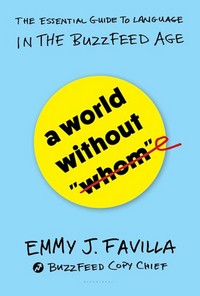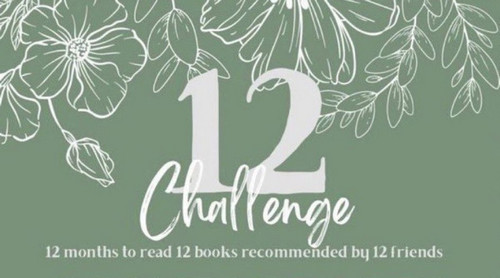 A World Without “Whom”:
A World Without “Whom”:
The Essential Guide to Language
in the BuzzFeed Age
DETAILS: Publisher: Bloomsbury USA Publication Date: November 13, 2017 Format: Hardcover Length: 363 pg. Read Date: June 29-July 4, 2022

World peace Is a noble ideal, but I’d like to step that goal up a notch: A world with peace and without whom is the place I’d like to spend my golden years, basking in the sun, nary a subjunctive mood in sight, figurative literallys and comma splices frolicking about.
This is a book about feelings, mostly—not about rules, because how can anyone in good conscience create blanket rules for something as fluid, as personal, and as alive as language? Something that is used to communicate literally (literally) every thought, every emotion humans are capable of experiencing, via every medium in existence, from speech to print to Twitter to Snapchat? We can’t. Nearly everything about the way words are strung together is open to interpretation, and so boldly declaring a sentence structure “right” or “wrong” is a move that’s often subjective, and we’d be remiss not to acknowledge that most of the guidelines that govern our language are too. Communication is an art, not a science or a machine, and artistic license is especially constructive when the internet is the medium.
What’s A World Without “Whom” About?
This could easily—very easily—be a book I take 10 paragraphs to describe, so I’m going to have mercy on you and me and borrow the description from the Publisher.
A World Without “Whom” is Eats, Shoots & Leaves for the internet age, and BuzzFeed global copy chief Emmy Favilla is the witty go-to style guru of webspeak.
As language evolves faster than ever before, what is the future of “correct” writing? When Favilla was tasked with creating a style guide for BuzzFeed, she opted for spelling, grammar, and punctuation guidelines that would reflect not only the site’s lighthearted tone, but also how readers actually use language IRL.
With wry cleverness and an uncanny intuition for the possibilities of internet-age expression, Favilla makes a case for breaking the rules laid out by Strunk and White: A world without “whom,” she argues, is a world with more room for writing that’s clear, timely, pleasurable, and politically aware. Featuring priceless emoji strings, sidebars, quizzes, and style debates among the most lovable word nerds in the digital media world—of which Favilla is queen—A World Without “Whom” is essential for readers and writers of virtually everything: news articles, blog posts, tweets, texts, emails, and whatever comes next . . . so basically everyone.
At one point, Favilla cites a book, Internet Linguistics: A Student Guide, noting that it “was published in 2011, aka eons ago in internet time.” This book was published in 2017, making it eons-old by that standard, and a tad dated. But it still works and may even trigger a pleasant memory or two with a then-topical joke/reference.
The Overall Tone/Voice
This is a funny book. Favilla writes with a lot of passion, which helps in addressing what most would consider a dry and arid topic. But even better than the intensity of some of her thoughts, it’s the humor. I don’t know if I made it 3 pages without coming across a solid laugh line—and generally, it was fewer.
Granted, it may take a particular and peculiar sense of humor to find joes about conjunction use fodder for laughter, but if that’s your poison…
Even when she’s not going for the big laugh, but simply explaining something her style is fun. You can’t not have a good time reading this (even when she encourages something like “verbifying with abandon.” Just quoting those three words makes me want to scrub my hands like Adrian Monk.
A Couple of Nice Bonuses
As one should expect from a book that invokes BuzzFeed twice on the cover, the book is filled with graphics and lists—and even a couple of quizzes.
My favorite lists are “Standard Punctuation Marks, Ranked from Worst to Best,” (I’d literally have a poster of this hanging next to my desk if there was room for anything but bookshelves there) and “Old-Timey Words You Need to Start Using Again” (there’s a version on BuzzFeed)
So, what did I think about A World Without “Whom”?
Hey, remember Latin and its roughly 18,239,721 conjugations for every word? (If you don’t, your high school days were much brighter and probably filled with many more cool parties than mine.) We survived the evolution away from declensions, and we will survive this free-for-all era unscathed as well. Simpler doesn’t necessarily equate to a loss of impact or clarity. It just means fewer strict guidelines to follow. And that’s okay. Have you read the news lately? We have enough utterly horrifying, faith-in-humanity—destroying stuff going on in our day-today to worry about.
The fear that our language is deteriorating because we’re making calculated decisions to nix periods or because more people are pretending that whom doesn’t exist or they’re swapping emojis for words is as irritating as the performance that die-hard carnivores often put on of a paralyzing fear of trying vegan food. Pull yourself together. It’s not going to kill you, and it might actually make you a more well-rounded person with a new perspective.
This is not a book for the die-hard prescriptivist when it comes to language use. Favilla bases her positions and stylistic choices on feelings (and literally tells you that on page 1—which is not to say that there’s no thought involved) and what she thinks will communicate more clearly. But she’ll say time after time, that her rules are subjective and writers should make up their own minds. Especially when it comes to the internet—she will draw a line between print and online writing and doesn’t seem to have a problem with more formal writing being done for traditional/print publications—as long as the internet can be the Wild West.
I’m reflexively a prescriptivist and will tend toward that kind of usage/take/book. But anyone who’s read this particular site for any length of time (even if this post is your first!), will know I’m clearly not a strict practitioner of the rules Mrs. Hammer and Mr. Nelson pounded into me in Middle School. She didn’t convince me on some points, and I’d still side with Strunk, White, and Dreyer at any point they disagreed with her. But I had so much fun reading this—and learning from it, I have to admit—that I don’t mind her somewhat anarchical approach.*
*I halfway expect that in 2053, if someone reads this book they’ll find that this is a straightjacket in terms of free expression.
And since this is supposed to be what I thought about the reading experience, not if I agree with her on every jot and tittle, I have no problem recommending it. If you’re the kind of person who gets worked up about getting your phrasing juuuuuust right or are bothered when someone doesn’t. If you think reading tributes to commas and em dashes is a good time. Or if you’re curious about why someone would want to eliminate whom or is fine with letting the English subjunctive mood die…this is the book for you. I’m very glad that Jodie recommended this one to me.
And, I think I came away from this with an idea for my next tattoo. So, right there, this was worth the time for me.


This post contains an affiliate link. If you purchase from it, I will get a small commission at no additional cost to you. As always, opinions are my own.
![]()




WS_BOOKCLUB
I’ve been curious about your thoughts on this. Great review, as always!
HCNewton
Awwww, thanks Jodie (sorry about misspelling your name, too!)